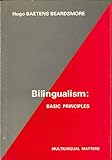Bilingualism : Beyond Basic Principles / ed. by Jean-Marc Dewaele, Alex Housen, Wei Li.
Material type: TextSeries: Multilingual MattersPublisher: Bristol ; Blue Ridge Summit : Multilingual Matters, [2003]Copyright date: ©2003Description: 1 online resource (248 p.)Content type:
TextSeries: Multilingual MattersPublisher: Bristol ; Blue Ridge Summit : Multilingual Matters, [2003]Copyright date: ©2003Description: 1 online resource (248 p.)Content type: - 9780905028057
- 9781853596315
- 404/.2 22
- online - DeGruyter
| Item type | Current library | Call number | URL | Status | Notes | Barcode | |
|---|---|---|---|---|---|---|---|
 eBook
eBook
|
Biblioteca "Angelicum" Pont. Univ. S.Tommaso d'Aquino Nuvola online | online - DeGruyter (Browse shelf(Opens below)) | Online access | Not for loan (Accesso limitato) | Accesso per gli utenti autorizzati / Access for authorized users | (dgr)9781853596315 |
Frontmatter -- Contents -- Preface -- Contributors -- Introduction and Overview -- 1. Who is Afraid of Bilingualism? -- 2. The Importance of Being Bilingual -- 3. Towards a More Language-centred Approach to Plurilingualism -- 4. Bilingual Education: Basic Principles -- 5. Bilingual Encounters in the Classroom -- 6. Language Planning: A Grounded Approach -- 7. Accepting Bilingualism as a Language Policy: An Unfolding Southeast Asian Story -- 8. Markets, Hierarchies and Networks in Language Maintenance and Language Shift -- 9. The Imagined Learner of Malay -- 10. Code-switching and Unbalanced Bilingualism -- 11. Code-switching: Evidence of Both Flexibility and Rigidity in Language -- 12. Rethinking Bilingual Acquisition -- Laudatio: Hugo Baetens Beardsmore – No Hyphen Please! -- Index
restricted access online access with authorization star
http://purl.org/coar/access_right/c_16ec
The publication of Hugo Baetens Beardsmore’s book Bilingualism: Basic Principles by Multilingual Matters in 1982 coincided with an unprecedented upsurge of interest in bilingualism. A major reason for this was the acknowledgement that bilingualism is far more common than was previously thought, and perhaps even the norm. The number of bilinguals at the turn of the third millennium is probably greater than ever before and will continue to grow as a result of the combined forces of globalisation, automatisation, increased mobility and migration, and modernisation of foreign language teaching. The contributions in this book prove that, given the right conditions, bilingualism can confer distinct benefits like intellectual, psychological, social, cultural and economic improvement on the individual. The papers in this volume have been written by leading scholars in the field of bilingualism and deal with individual bilingualism, societal and educational phenomena, addressing issues such as bilingual usage, acquisition, teaching, and language planning and policy. The volume’s major asset lies in its diversity, not only in depth of investigation and in topical variety but also in the range of languages and geographical regions covered. Another important feature of the volume is its multidisciplinary perspective. Among the contributors are linguists, sociologists, psychologists and sociolinguists.
Mode of access: Internet via World Wide Web.
In English.
Description based on online resource; title from PDF title page (publisher's Web site, viewed 01. Dez 2022)


